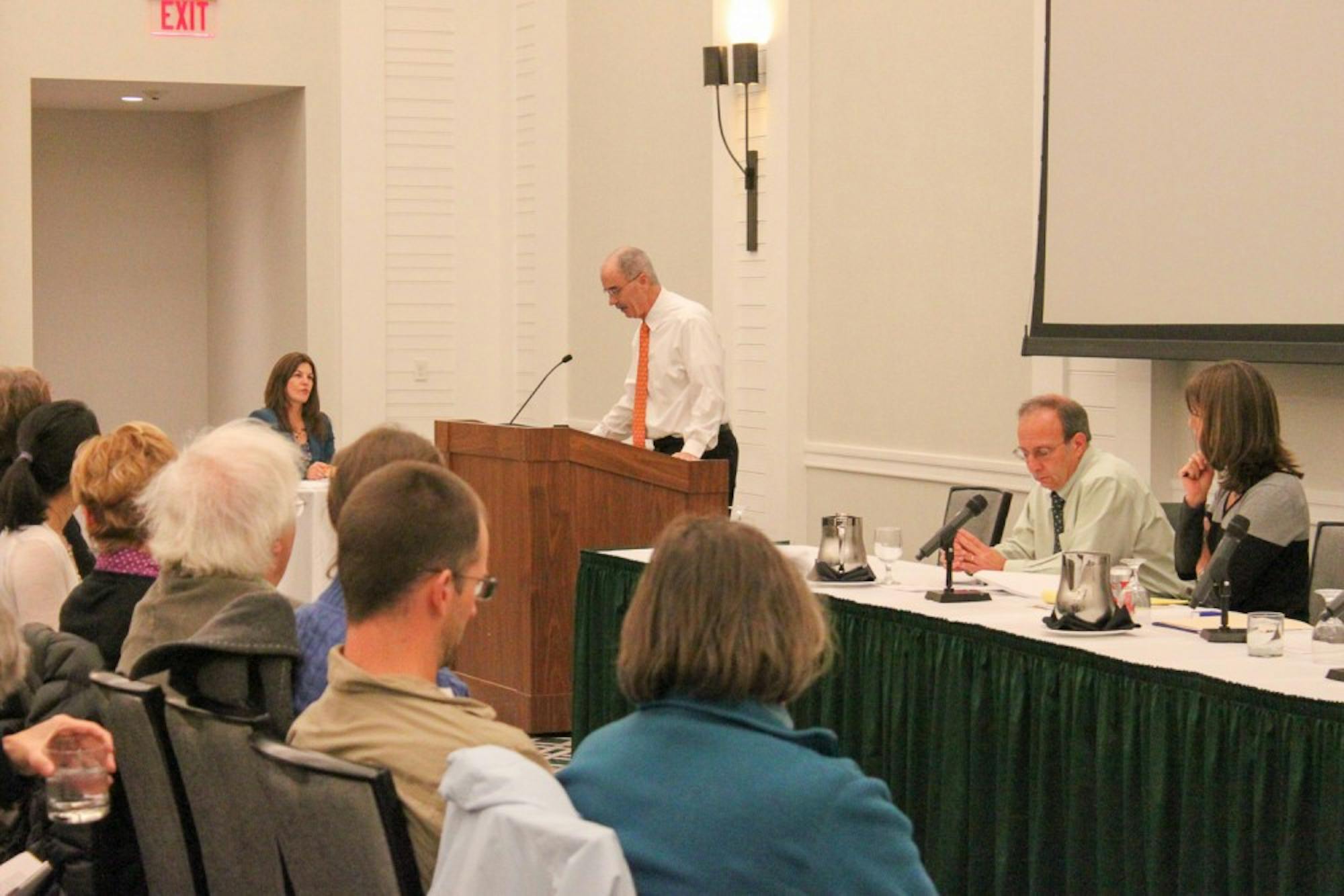College President Phil Hanlon discussed social opportunities for students, building a more inclusive community and the challenges that face the Dartmouth community — including high-risk drinking, sexual assault and violence — at a faculty meeting on Monday. Dean of the College Charlotte Johnson followed Hanlon’s speech with a presentation on the results from the Committee on Student Safety and Accountability report, which lays out plans for dealing with campus social issues.
With regard to sexual assault, Hanlon said important efforts are already underway. Jennifer Messina, a clinical psychologist and director of training and development at GreenDot, is advising the College in its efforts. She introduced the Dartmouth Bystander Initiative, which trains community members on how to intervene when a social encounter is likely to lead to an assault.
So far, more than 600 students have participated, and 90 percent of those said they would recommend the training to a friend. Dartmouth’s efforts have also been noticed by others — clinical psychologist David Lisak, another leader in the study of sexual assault on college campuses, invited Dartmouth to co-host a conference with him on strategies for the future, Hanlon said.
Hanlon and his administration have begun efforts to improve mechanisms for reporting sexual assault, supporting survivors and enforcing policies that hold students accountable.
The Sexual Assault Awareness Program has expanded and is interviewing finalists in a search for a survivor advocate, tasked with directly supporting sexual assault victims.
Johnson is working on improving the College’s adjudication system to include more highly trained judicial panel members to hear complex sexual assault cases.
In remarks about high-risk drinking, Hanlon touted the success of programs already in place.
Hanlon said the Brief Alcohol Screening and Intervention for College Students program, started at Dartmouth in 2011, is a proactive policy in addressing high-risk drinking. The program consists of students taking a 20-minute online assessment of their alcohol use, followed by a one-on-one coaching session and follow-up sessions at three, six and 12 months. Hanlon said students had significantly reduced their alcohol consumption within 90 days of starting the program.
A male member of the Class of 2016 who wished to remain anonymous because he is underage, said he benefitted from BASICS.
“It did definitely help me,” he said. “It explained to me the appropriate BAC levels for the body. I’ve reduced my drinking and spaced it out more.”
The number of students engaging in high-risk drinking, specifically students found with a blood alcohol content above 0.25, has also declined. The number of encounters of students above the 0.25 BAC threshold has fallen to 31 in 2013, from 61 in 2012 and 80 in 2011. Although the number of Good Samaritan calls has not yet decreased, Hanlon suggested that this is a good sign because students are continuing to call for help when they feel their peers are in danger.
Hanlon made several suggestions to change the current residential life system. Hanlon said theme-based residences, centered around academic pursuits and other interests such as undergraduate research or entrepreneurship, could attract like-minded students and faculty.
Since residence halls are an effective medium for building a sustained community, he proposed giving students the opportunity to return to their current residence halls after leave terms throughout their four years at Dartmouth. One of the ways to accomplish this is by encouraging more even enrollment across all four academic terms.
“I am persuaded that Dartmouth would benefit from more balanced enrollments over our four terms so that we can, amongst other things, allow students greater opportunity to remain in a particular residence hall term after term after term — to build identity and a circle of friends in that hall,” Hanlon said.
Hanlon then turned to building a more inclusive community at Dartmouth. He pointed to the Office of Pluralism and Leadership and increased diversity within the student body as recent advancements. Hanlon also pointed to the Board of Trustees’s recent approval of the Triangle House, which will support LGBT community members.
Hanlon emphasized the importance of programming outside the Greek system. He said Dartmouth should not be complacent with new programming initiatives launched in the fall, such as Collis After Dark events and the outdoor concerts, and should continue to explore ways to engage students socially.
He proposed developing an arts and innovation district around the Hood Museum, Hopkins Center, Black Family Visual Arts Center and the new student entrepreneurial center. He said Dartmouth can improve these areas by investing in program support, creating new social spaces and improving food venues. Student organizations must also be invested in these changes, he added.
“Student organizations provide a positive instance of experiential learning, with learning outcomes that can include independence, confidence and leadership,” Hanlon said. “They enrich our campus community in many ways, and many seek to make a meaningful impact on the region or world.”
The launch of the intergroup dialogue pilot program, in which students explore issues of identity, diversity and inequity, is another step toward furthering inclusivity. Roughly 90 percent of fall term participants said they would recommend the program to their peers, and the experience will be incorporated in the for-credit class “Rhetorics of Race” next year.
Kaila Pedersen ’14 said the program helped begin positive dialogue.
“We were able to share stories and get to see those little below-the-surface things about people that I never think about and wouldn’t have thought about otherwise,” Pedersen said. “It was a cool start to conversations I want to keep having around campus and life in general.”
Hanlon ended his remarks with a call to action to the faculty, encouraging them to become involved in the initiatives he laid out throughout his speech.




